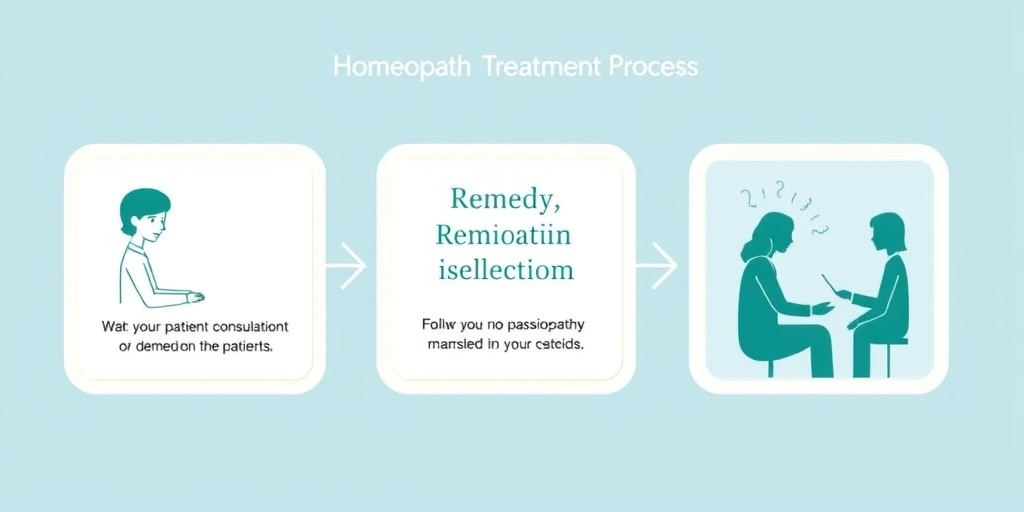What Is Homeopathy?
Homeopathy is a holistic healing system that has gained popularity worldwide for its gentle and natural approach to health. Developed in the late 18th century by Samuel Hahnemann, this alternative medicine practice is based on the principle of treating “like with like.” In other words, a substance that causes symptoms in a healthy person can be used in diluted forms to treat similar symptoms in someone who is ill.
Unlike conventional medicine, which often focuses on alleviating symptoms, homeopathy aims to stimulate the body’s innate healing abilities. This makes it a unique and appealing option for many individuals seeking a more natural path to wellness. Homeopathy is used to address a wide range of conditions, from acute ailments like colds and coughs to chronic issues such as allergies and digestive disorders.
The Meaning of Homeopathy
The term “homeopathy” comes from the Greek words “homoios,” meaning similar, and “pathos,” meaning suffering. This reflects the core philosophy of homeopathy: treating patients with remedies that mimic their symptoms. Homeopathic remedies are prepared through a process of serial dilution and succussion (vigorous shaking), which proponents believe enhances the healing properties of the substances used.
Homeopathy Around the World
Homeopathy is practiced globally, with a significant following in countries like Germany, India, and the United States. In Germany, for instance, many people consult a homeopathy doctor in Frankfurt or other cities for various health issues. The growing interest in homeopathy in Germany and beyond has led to the establishment of numerous homeopathy pharmacies that specialize in these remedies.
Homeopathy Principles
The principles of homeopathy are foundational to its practice and effectiveness. Understanding these principles can help you appreciate how homeopathy works and why it may be a suitable option for your health needs.
1. Law of Similars
The first principle of homeopathy is the Law of Similars. This principle posits that a substance that produces symptoms in a healthy individual can be used to treat similar symptoms in a sick individual. For example, if a person experiences a cough when exposed to a particular plant, a homeopathic remedy derived from that plant may help alleviate a similar cough in someone who is ill.
2. Individualized Treatment
Homeopathy emphasizes the importance of treating the individual rather than just the disease. Each person is unique, and their symptoms may manifest differently. A homeopathy doctor will take into account not only the physical symptoms but also the emotional and psychological state of the patient. This holistic approach ensures that the treatment is tailored to the individual’s specific needs.
3. Potentization
Homeopathic remedies undergo a process called potentization, which involves serial dilution and succussion. This process is believed to enhance the healing properties of the remedy while minimizing potential side effects. The result is a highly diluted solution that retains the essence of the original substance, making it safe for consumption.
4. Minimal Dose
Homeopathy operates on the principle of using the minimal dose necessary to trigger the body’s healing response. This means that homeopathic remedies are often administered in very small quantities, which is a stark contrast to conventional medicine that may use higher doses of active ingredients. This approach aligns with the homeopathic belief that less is more when it comes to stimulating the body’s natural healing processes.
5. Holistic Approach
Finally, homeopathy takes a holistic approach to health. It considers the physical, emotional, and mental aspects of a person’s well-being. By addressing the root causes of illness rather than just the symptoms, homeopathy aims to restore balance and promote overall health. This comprehensive perspective is particularly beneficial for chronic conditions where multiple factors may be at play.
In conclusion, homeopathy offers a unique and holistic approach to health and wellness. Whether you’re seeking relief from a specific ailment or looking to enhance your overall well-being, exploring homeopathy may be a worthwhile endeavor. For more information and evidence-based health answers, consider visiting Yesil Health AI at yesilhealth.com. 🌿✨

Homeopathy Remedies
Homeopathy is a holistic approach to health that utilizes natural substances to stimulate the body’s healing processes. This alternative medicine system is based on the principle of “like cures like,” meaning that a substance that causes symptoms in a healthy person can be used to treat similar symptoms in a sick person. Here are some popular homeopathy remedies that you might find beneficial:
1. Arnica Montana
Arnica is widely known for its effectiveness in treating bruises, muscle soreness, and joint pain. It is often used by athletes to reduce swelling and promote healing after injuries. You can find arnica in various forms, including creams, gels, and tablets.
2. Belladonna
This remedy is commonly used for conditions characterized by sudden onset and intense symptoms, such as fever, headaches, and inflammation. Belladonna can help alleviate symptoms like throbbing pain and sensitivity to light.
3. Nux Vomica
Nux Vomica is particularly useful for individuals who experience digestive issues, especially after overindulgence in food or alcohol. It can help relieve symptoms like nausea, bloating, and irritability.
4. Pulsatilla
Pulsatilla is often recommended for emotional conditions and respiratory issues. It is especially effective for individuals who are sensitive and crave comfort. This remedy can help with symptoms like coughs, colds, and sinus congestion.
5. Rhus Toxicodendron
This remedy is beneficial for treating joint pain and stiffness, particularly when symptoms worsen with rest and improve with movement. It is commonly used for conditions like arthritis and tendonitis.
When considering homeopathy, it’s essential to consult with a qualified homeopathy doctor to ensure you choose the right remedy for your specific needs. You can find a homeopathy doctor near you or even search for one in cities like Frankfurt, where homeopathy is gaining popularity.
Homeopathy Benefits
Homeopathy offers a range of benefits that make it an appealing choice for many individuals seeking alternative treatment options. Here are some of the key advantages:
1. Holistic Approach
Homeopathy treats the individual as a whole rather than just addressing specific symptoms. This holistic approach considers emotional, mental, and physical aspects of health, leading to more comprehensive care.
2. Minimal Side Effects
One of the most significant benefits of homeopathy is its low risk of side effects. Homeopathic remedies are highly diluted, making them safe for people of all ages, including children and pregnant women. This makes homeopathy a gentle alternative to conventional medications.
3. Personalized Treatment
Homeopathy emphasizes individualized treatment plans. A homeopath will take into account your unique symptoms, lifestyle, and health history to tailor a remedy that suits your specific needs. This personalized approach can lead to more effective outcomes.
4. Strengthens the Immune System
Homeopathic remedies can help boost the immune system, making it easier for the body to fight off infections and illnesses. This is particularly beneficial for those who frequently suffer from colds, coughs, and other respiratory issues.
5. Cost-Effective
Homeopathy can be a more affordable option compared to conventional treatments, especially for chronic conditions that require ongoing medication. Many homeopathic remedies are available over-the-counter at homeopathy pharmacies, making them accessible and budget-friendly.
In conclusion, homeopathy offers a unique and effective approach to health and wellness. Whether you’re looking for remedies for specific ailments or seeking a holistic treatment plan, homeopathy can provide valuable support. If you’re in Germany, particularly in cities like Frankfurt, you can easily find a homeopathy doctor to guide you on your healing journey. 🌿✨

Homeopathy vs Conventional Medicine
When it comes to healthcare, individuals often find themselves at a crossroads between homeopathy and conventional medicine. Both approaches have their unique philosophies, methods, and applications. Understanding the differences can help you make informed decisions about your health.
What is Homeopathy?
Homeopathy is a holistic healing system that was developed in the late 18th century by Samuel Hahnemann. It operates on the principle of “like cures like,” meaning that a substance that causes symptoms in a healthy person can be used to treat similar symptoms in a sick person. Homeopathic remedies are highly diluted substances, often derived from plants, minerals, or animals, and are prepared through a process called potentization.
What is Conventional Medicine?
Conventional medicine, also known as allopathic medicine, is the mainstream approach to healthcare. It focuses on diagnosing and treating diseases primarily through medications, surgery, and other interventions. Conventional medicine is evidence-based, relying on scientific research and clinical trials to determine the efficacy of treatments.
Key Differences
- Philosophy: Homeopathy emphasizes the body’s ability to heal itself, while conventional medicine often targets symptoms directly.
- Treatment Approach: Homeopathy uses highly diluted remedies, whereas conventional medicine typically employs stronger medications and surgical procedures.
- Side Effects: Homeopathic remedies are generally considered safe with minimal side effects, while conventional medications can have significant adverse effects.
- Personalization: Homeopathy takes a personalized approach, tailoring treatments to the individual, while conventional medicine often follows standardized protocols.
Both systems have their merits and can be effective in different scenarios. Some individuals may find that a combination of both approaches works best for their health needs. 🌱
Homeopathy Safety
Safety is a paramount concern when it comes to any form of treatment, and homeopathy is no exception. Understanding the safety profile of homeopathic remedies can help alleviate concerns and promote informed choices.
Are Homeopathic Remedies Safe?
Homeopathic remedies are generally considered safe for most people, including children and pregnant women. Because these remedies are highly diluted, they typically do not produce the same side effects associated with conventional medications. However, it is essential to consult with a qualified homeopathy doctor to ensure that the remedies are appropriate for your specific condition.
Potential Risks
While homeopathy is largely safe, there are a few considerations to keep in mind:
- Delayed Treatment: Relying solely on homeopathy for serious conditions may delay necessary medical treatment. It’s crucial to seek conventional medical care when needed.
- Quality of Remedies: Not all homeopathic products are created equal. Ensure you obtain remedies from reputable homeopathy pharmacies to avoid substandard products.
- Individual Reactions: Although rare, some individuals may experience adverse reactions to specific homeopathic remedies. Always monitor your response and consult a professional if concerns arise.
Consulting a Homeopathy Doctor
Finding a qualified homeopathy doctor is vital for ensuring safe and effective treatment. Look for practitioners who are licensed and have a solid understanding of both homeopathic principles and your health needs. In cities like Frankfurt and throughout Germany, there are many experienced homeopaths available to guide you on your healing journey.
In conclusion, while both homeopathy and conventional medicine have their unique strengths, understanding their differences and safety profiles can empower you to make informed health choices. Whether you choose homeopathy for conditions like a cough or seek conventional treatments, the key is to prioritize your well-being. 🌼

Homeopathy for Common Ailments
Homeopathy is a holistic approach to health that focuses on treating the individual as a whole rather than just addressing specific symptoms. This alternative medicine system has gained popularity for its effectiveness in managing various common ailments. Below, we explore some of the most prevalent conditions that can benefit from homeopathy.
1. Homeopathy for Cough
Coughing can be a bothersome symptom, often resulting from colds, allergies, or respiratory infections. Homeopathic remedies can help alleviate coughs by addressing the underlying cause rather than just suppressing the symptom. Some popular homeopathic remedies for cough include:
- Belladonna: Effective for dry, spasmodic coughs that worsen at night.
- Hepar Sulphuris: Useful for a cough that is accompanied by a feeling of constriction in the throat.
- Spongia Tosta: Ideal for a barking cough that sounds like a seal.
Consulting a homeopathy doctor can help you find the right remedy tailored to your specific symptoms.
2. Homeopathy for Allergies
Allergies can manifest in various forms, including hay fever, skin rashes, and food intolerances. Homeopathy offers a gentle approach to managing these reactions. Remedies such as:
- Allium Cepa: Often recommended for allergic rhinitis with watery eyes and a runny nose.
- Urtica Urens: Helpful for skin allergies that cause itching and hives.
These remedies work by stimulating the body’s natural healing processes, providing relief without the side effects commonly associated with conventional medications.
3. Homeopathy for Digestive Issues
Digestive problems like bloating, constipation, and diarrhea can significantly impact your quality of life. Homeopathy can provide effective solutions for these issues. Some remedies include:
- Nux Vomica: Ideal for digestive disturbances caused by overindulgence.
- Arsenicum Album: Useful for food poisoning and diarrhea.
By addressing the root cause of digestive discomfort, homeopathy can help restore balance and promote overall digestive health.
4. Homeopathy for Stress and Anxiety
In today’s fast-paced world, stress and anxiety have become common ailments. Homeopathy offers a natural way to manage these feelings. Remedies such as:
- Argentum Nitricum: Effective for anxiety related to performance or anticipation.
- Gelsemium: Helpful for anxiety that leads to physical symptoms like trembling.
These remedies can help calm the mind and restore emotional balance, allowing individuals to cope better with daily stressors.
Homeopathy Treatment Process
The homeopathy treatment process is unique and tailored to each individual. It involves several key steps that ensure a comprehensive understanding of the patient’s health and lifestyle.
1. Initial Consultation
The first step in the homeopathy treatment process is an in-depth consultation with a qualified homeopathy doctor. During this session, the practitioner will:
- Gather detailed information about your medical history.
- Discuss your current symptoms and any previous treatments.
- Explore your lifestyle, emotional state, and environmental factors.
This holistic approach allows the practitioner to gain a complete picture of your health, which is crucial for selecting the appropriate remedy.
2. Remedy Selection
Based on the information gathered during the consultation, the homeopath will select a remedy that best matches your symptoms and overall constitution. Homeopathic remedies are derived from natural substances and are prepared through a process of serial dilution and succussion (vigorous shaking). This process enhances the remedy’s healing properties while minimizing side effects.
3. Follow-Up Appointments
After the initial treatment, follow-up appointments are essential to monitor progress and make any necessary adjustments to the treatment plan. During these sessions, the homeopath will:
- Assess the effectiveness of the chosen remedy.
- Make modifications based on any changes in symptoms.
- Provide additional support and guidance for lifestyle changes.
Regular follow-ups ensure that the treatment remains effective and aligned with your evolving health needs.
4. Long-Term Health Management
Homeopathy is not just about treating acute conditions; it also emphasizes long-term health management. By addressing the root causes of ailments and promoting overall well-being, homeopathy can help you maintain a balanced and healthy lifestyle. This approach encourages patients to take an active role in their health, fostering a deeper understanding of their bodies and how to care for them.
In conclusion, homeopathy offers a comprehensive and personalized approach to treating common ailments and managing health. Whether you’re seeking relief from a cough, allergies, or stress, consulting a homeopathy doctor near you can provide the support you need for a healthier life. 🌱✨

Frequently Asked Questions about Homeopathy
What is Homeopathy?
Homeopathy is a holistic approach to medicine that treats patients using highly diluted substances, aiming to trigger the body’s natural healing processes. It is based on the principle of “like cures like,” meaning that a substance causing symptoms in a healthy person can be used to treat similar symptoms in a sick person.
How does Homeopathy work?
Homeopathy works by stimulating the body’s own healing mechanisms. Practitioners believe that the diluted remedies can help restore balance and promote overall health. The remedies are tailored to the individual’s specific symptoms and overall health condition.
Is Homeopathy safe for everyone?
Yes, homeopathy is generally considered safe for people of all ages, including children and pregnant women. However, it is essential to consult with a qualified practitioner to ensure the remedies are appropriate for your specific health needs.
Can Homeopathy be used alongside conventional medicine?
Absolutely! Many people use homeopathy in conjunction with conventional treatments. It’s important to inform your healthcare provider about any homeopathic remedies you are taking to avoid potential interactions.
Where can I find a Homeopathy doctor near me?
You can search online for a homeopathy doctor near me or check local directories. Many practitioners also have websites where you can learn more about their services and approach.
What conditions can Homeopathy treat?
Homeopathy can be used to address a wide range of conditions, including:
- Allergies
- Digestive issues
- Respiratory problems, such as coughs
- Skin conditions
- Emotional and psychological issues
What is the meaning of Homeopathy?
The term homeopathy comes from the Greek words “homoios,” meaning similar, and “pathos,” meaning suffering. It reflects the principle that a substance causing symptoms in a healthy individual can be used to treat similar symptoms in someone who is ill.
Are there Homeopathy pharmacies near me?
Yes, many areas have homeopathy pharmacies that specialize in providing homeopathic remedies. You can search online or ask your homeopathy practitioner for recommendations.
Is Homeopathy effective for coughs?
Many people find homeopathy effective for treating coughs and other respiratory issues. Specific remedies are tailored to the type and cause of the cough, making it a personalized treatment option.
What should I expect during a Homeopathy consultation?
During a homeopathy consultation, the practitioner will take a detailed health history, discuss your symptoms, and may ask about your lifestyle and emotional well-being. This comprehensive approach helps them select the most appropriate remedy for you.
How long does it take to see results from Homeopathy?
The time it takes to see results from homeopathy can vary depending on the individual and the condition being treated. Some may notice improvements within a few days, while others may take weeks or longer. Consistency and following the practitioner’s advice are key to achieving the best results.




